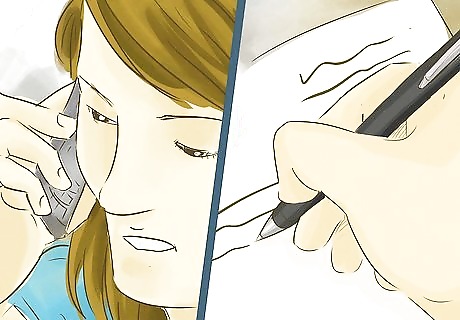
views
Talking it Out

Find a time to meet in person. Confronting past grievances in a face-to-face meeting can help bridge old rifts and improve communication. If you have ongoing conflict and you're a tight-knit family, you might even want to arrange a standing weekly or biweekly family meeting where everyone gets together to talk. This will help to keep everyone abreast of current issues and give everyone the opportunity to express themselves. Many families are dispersed across wide-ranging geographical boundaries, so getting together in person can be a somewhat rare occurrence. It may be necessary to talk over the phone or video chat. Even if the next such occurrence is a few months away, you can use the intervening time to organize your thoughts and plan your peaceful confrontation. If the only time your family gets together is the holidays, try not to use this as a time to work out your problems. People put a lot of expectations of magic of the holidays, and they can become more emotional and irrational when they feel that their holidays are ruined and become resentful of whomever they feel is responsible. Also, it can make people start to dread the holidays, as they come to associate them with stress and fighting. Reserve the holidays for savoring family time and find another time to talk about serious issues.

Establish ground rules for the discussion. Since the conflicts you're addressing are deeply personal, discussions can get heated quickly. Excessive emotion can derail the conversation and make it almost impossible to reach a productive resolution, so you should try to keep things calm and controlled. Do this by establishing a general code of conduct which forbids certain destructive behaviors, such as interrupting, bringing up unrelated quarrels, and name-calling. It can be helpful to enlist the input of the other party in formulating these rules so they don't feel like you are just parenting or lecturing them. Regulating the discussion can be easier if you have a disinterested party like a family friend or level-headed relative to mediate your discussion. If you have a big family but your lingering resentment involves just one or two other family members, you'll probably want to carve out a special appointment or time when just the aggrieved parties (and potentially a mediator) can meet and talk. This will avoid unnecessary interference from well-meaning relatives.

Express yourself with love. You might assume that everyone in the family knows how much you love them, but this isn't necessarily true. In fact, people often feel neglected when love isn't expressly articulated, so you should make sure to say it often, especially during an argument which addresses old wounds. So, when explaining your side of the story, make sure to do so with explicit declarations of love and affection. A good way to do this is bringing up positive memories and good times you've shared throughout the discussion. You'll be amazed how quickly these feel-good throwbacks will get everyone smiling and feeling closer. For example, preface a statement about how you've been hurt with, "I love you, and the reason I'm bringing this up is because our relationship is so valuable to me."

Listen to each other. You won't make any progress in your confrontation if you use the time when others are speaking to plan upcoming responses. Rather, you should be listening to others' feelings and words with an open and empathetic mind. Practice active listening by asking questions when you need clarification and repeating key points back to the person to ensure you understand. This way you show you're attentive and genuinely concerned with understanding them. You can also give small feedback gestures like nodding, leaning in, and light touches on the arm in order to make your interlocutor feel attended to. You might say something like, "What I'm hearing you say is... Is that right?"

Agree to move on. Perhaps the most important part of healing interpersonal conflict is coming to a mutual, explicit consensus that you're all going to make an effort to move forward. This agreement shifts the emphasis of old wounds to the future: you're all acknowledging the hurtful past while also recognizing that this past cannot be changed. The only things you can control are your actions and words going forward, so say something at the conclusion like, "Now that we've talked about this, let's agree to let this issue go and concentrate on improving our future behavior and relationship." It can help to write out a list or “contract” of behaviors and words you both agree to avoid or follow in the future. Things like “no passive aggressive texts,” “everyone must extend invitations to all family events—no petty exclusions!” and “no venting to mutual friends or family members” can help to remind everyone not to slip back into old habits and aggressions. Remember, too, that no one is perfect, and it can be hard to change ingrained behaviors. Forgive people when they slip up.

Stay in touch. Moving forward, strive to speak or write to one another more frequently. This small effort will keep lines of communication open and allow you to remind one another how much you care. It will also boost your psychological well-being and amplify your sense of satisfaction from unrelated aspects of life such as your career and friendships. This communication can be a brief text every few days saying, “Hi, how are you?” or “Thinking of you!” You could also tag each other in social media pictures or memes, such as a #TBT photo on Instagram, or set up a ten-minute weekly phone call. It's important to emphasize taking an interest in the other person and asking about their life, not just sharing your own information, to show that you truly care about them.
Making Amends

Reflect on your wrongdoing and resultant guilt. If you have done something offensive or hurtful to your family, the first steps to making amends are to recognize your blame in the conflict, reflect on the reasons for your behavior, and what impact it has had on everyone. This thoughtful introspection will help to make your apology more meaningful and effective when you eventually deliver it to injured family members. Make sure that you analyze the underlying motivations behind your urge to apologize. A genuine apology cannot be contingent on speedy forgiveness, so if you're wanting to make amends simply in order to feel the relief of forgiveness, you should reconsider whether or not you're truly ready to make a heartfelt apology.

Apologize. Once you've gathered your thoughts and feel ready to approach those you've hurt, extend a heartfelt apology to your loved ones. You can do this through a letter or email, or in person. No matter what method you choose, the most important thing is to be direct, accept accountability without dodging blame or rationalizing, and show you have thought about the impact of your actions. For example, don't say something like, “I'm so sorry for hurting your feelings. I never intended to hurt you, and in any case I was really upset about what you said to me that one time. But anyway, I'm sorry!” Instead, say, “I'm so sorry for what I did. It was a foolish and small-minded thing to do, and I want you to know how regretful I am.” Allow the other parties to explain how they were hurt by your behavior. Feeling heard is an important part of being able to forgive someone. Listening to the person without interrupting, defending yourself, or making excuses does a lot of the work for you.

Emphasize your desire to make amends. An apology seems somewhat hollow if it focuses solely on the past wrongdoing. In order for your compunction to ring true, you should also promise never to repeat the same offense. In other words, you're not just extending a flimsy, retrospective excuse, but vowing to work at correcting your behavior in the future. Be as specific and concrete as possible in order to demonstrate that you've thought about how to realistically amend and avoid personal pitfalls. For example, if you are apologizing for gossiping and saying malicious things about a family member, don't just say, “I'll never do it again!” Rather, say something like, “I feel terrible about what I said and promise not to repeat it. I think I was using these texts to friends as a way to vent about other things and frustrations in my life, so I have started writing a journal or seeing a therapist in order to deal with my problems in more productive ways.” It can often be helpful to ask, "How can I make this up to you?"

Accept that forgiveness and healing take time. Of course you want your family to forgive you for what you've done, but you need to manage your expectations regarding this process. Acknowledge your family's right to take as much time as they need to think about your apology and that, just because you've apologized, you're not owed forgiveness. In the same way, if you've also been hurt by your family members and they've apologized, you should recognize your own right to take time before accepting and forgiving. It's not a bad idea to include this lack of expectations in your apology. This will show your family that you're respectful of their feelings and aren't putting pressure on them. Say something like, “No matter how you decide to respond to my apology, I needed to express my sincere regret. Of course I want you to forgive me, but I know that I have no right to expect this from you, so take your time and know I'm here to talk whenever you're ready.”
Recovering from Betrayal or Trauma

Seek help from a licensed professional. If you're nursing a serious family wound, such as childhood abuse or neglect, you should deal with this injury as soon as possible. Otherwise, if you keep suppressing it, you'll find your ability to trust and love in other relationships and aspects of life will suffer. For serious problems, you should seek the help of a therapist to analyze and guide you through your feelings. A licensed professional can also help you brainstorm ways to deal with the past and move on in the future. If you have health insurance, you should ask your provider about which doctors or services they cover. Websites like PsychologyToday and goodtherapy.org have searchable online databases that can help you find professionals in your area.

Identify your goals for recovery. When reflecting on the impact a betrayal or trauma has had on your life, have your therapist help you identify your objectives for the process. For example, do you want to eventually forgive your family member and re-forge former bonds? Or, do you just want to find a way to get over the past so that it doesn't affect your life in the future? Since seriously abusive family members rarely apologize for the past, your goals should not include receiving an apology or even recognition from the injurious person.

Do things that make you feel good about yourself. Personal healing after painful family wounds is largely dependent on self-esteem: you'll only be able to acknowledge your pain and get over any associated shame if you believe you're a person worthy of respect and happiness. You can work on building this self-esteem by investing time and energy in yourself and your interests. Physical activities like jogging, swimming, or team sports will buoy your mood by releasing endorphins and relieve anxiety by burning off adrenaline. Creative pursuits such as painting or writing will help you to express your feelings and feel a sense of accomplishment, as well as helping you recover from family trauma.

Build strong relationships with others. Getting over a troubled family past is much easier if you work on building trust and intimate relationships with friends. It will improve your self-esteem, improve your mental health, and even boost your physical health, all while proving that you aren't totally dependent on nuclear family ties. You can strengthen existing friendships by making time for personal conversations, trust-building activities, and attending one another's special events.

Write a letter or make a phone call. One of most important parts of the healing process is closure, and a wonderful way to achieve closure is to write a letter and express unaired feelings. Even if the other person doesn't claim accountability or never even responds to the letter, you'll feel a sense of relief at having released pent-up sadness and anger. Depending on your goals, you might have decided not to address the family member directly. You can still reap the therapeutic benefits of this step, though, by writing a letter which you won't actually send. You can say all the things you've always wanted without putting yourself in a vulnerable position and potentially re-aggravating healing wounds.

Forgive. Even if you intend to never see or speak to the offending family member again, you might want to consider forgiving the family member for the sake of your own mental and emotional wellbeing. This is because forgiveness can help you let go of the past and feel liberated moving forward. You can ask your therapist for help creating a manageable, productive plan for forgiveness that doesn't compromise your progress.

Know when to end the relationship. If there is an abusive family member, it may be necessary to dissolve your relationship with that person. As hard as it is to repair conflict within the family, it is equally as hard to protect yourself from an abuser within the family, especially if you experience pressure from other family members to have a relationship with the person. This can be very difficult and complicated, so enlist the help of a therapist to strategize how to do this. You may wish to tell the other members of your family why you are ending this relationship. An unfortunate truth is sometimes other family members will not want to believe what you are saying. Your therapist can help you prepare for this. If other family members are siding with your abuser, then you may need to remove them from your life as well.
Building Future Bonds

Appreciate the uniqueness of your family. Building a better future for your family will be a lot easier if you recognize how special your family is and how these bonds are worth preserving. Do this by looking at your family's quirks, complicated dramas, or unorthodox structure not as embarrassing problems, but as special strengths and reminders of how irreplaceable your family really is. It can also help to remember that, no matter how perfect other families may seem, every family has its own problems.

Focus on the present. It's important to acknowledge past problems and conflicts, but you shouldn't belabor the past and let it dominate the present. This will just extend old problems and delay healing in the present. Show everyone you're serious about this principle by establishing a common family rule to leave the past in the past and focus on positive behaviors and supportiveness in the present. Making new memories can be helpful in this regard. If old traditions seem to belabor pain from the past, try new experiences together as a family. A good, concrete way to stop belaboring the past is to avoid bringing up past resentments in current conflicts. For example, if you're arguing with a family member about a loan which hasn't been paid back to you in the agreed time frame, stop yourself from using past money issues and unpaid loans into the present argument. Focus on steps for resolving the current issue and, if the same thing happens again, make a policy never to lend money to that family member again.

Be vocal and positive about the progress you've made. While old family wounds can take time to heal, you should remind one another how far you've come and what positive steps you've made. This way you won't feel like the process has been futile and that you're just slipping back into old behaviors. For example, when a family member who always missed your concerts or basketball games in the past shows up to one, send them a text afterward saying how much you appreciated their presence and support. If you've noticed a family member making an effort to use kinder words and tones in disagreements, compliment them on their effort and express your appreciation.

Demonstrate love. While conflicts are unavoidable to some extent, you can minimize their damage by spotlighting the love and deep bonds among one another. You should do this in many ways: don't just articulate your love verbally, but also perform actions which demonstrate love. For example, give small presents such as hand-picked flowers, favorite candies or cookies, and little seasonal knick-knacks for no particular reason. You can also show that you care by being of service in simple ways. For example, bring over morning coffee and bagels, drop into your family member's workplace just to say hello, make dinner for the family, or offer to help with fixing a computer bug or installing a shelf. For many people, physical affection is the most significant sign of love. It's a person by person basis, but you may consider hugs and handshakes.

Find times to laugh together. Laughter has been shown to have numerous mental and even physical health benefits, and you'll be surprised how much of a positive impact it can have on your family dynamic. Next time you're planning a family gathering, make sure it includes plenty of chuckles and fun. For example, rent a funny film and have a movie night, play a side-splitting board game like Apples to Apples or Taboo, or go see an improv comedy show in a group outing.

















Comments
0 comment